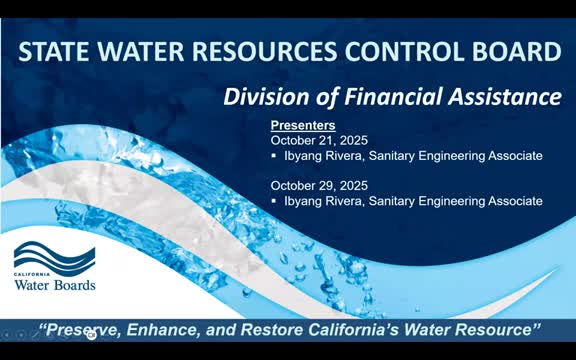State Water Resources Control Board briefs attendees on SRF loans, drinking water programs, emerging contaminants and technical assistance
Get AI-powered insights, summaries, and transcripts
Subscribe
Summary
The State Water Resources Control Board’s Division of Financial Assistance presented on Clean Water and Drinking Water State Revolving Funds, programs addressing emerging contaminants and technical assistance and interim drinking water solutions for small disadvantaged communities.
A representative of the State Water Resources Control Board’s Division of Financial Assistance outlined wastewater and drinking water funding programs, site cleanup programs and technical assistance available to small and disadvantaged communities.
Why it matters: these state-administered funds and technical assistance channels are primary sources for water infrastructure, emergency drinking water and site cleanup funding in California.
Yipian Rivera (Division of Financial Assistance) described the Clean Water State Revolving Fund (CWSRF), the Water Recycling Funding Program (WRFP), Drinking Water State Revolving Fund (DWSRF) and other programs used to finance planning and construction projects that maintain compliance with waste discharge and Safe Drinking Water Act requirements. Rivera said priority for certain programs is given to small disadvantaged communities and septic-to-sewer conversions.
Rivera outlined interim drinking water solutions funding for urgent needs (bottled water, hauled water, well repair, point-of-use devices) and noted programs that assist domestic well owners and state small water systems. The board also administers lead service line inventory and replacement funding and an Emerging Contaminants Funding Program that can use DWSRF and other sources to address PFAS and similar contaminants.
Rivera described site-cleanup programs for orphan leaking underground storage tanks, grants and loans for small-business UST owners, and nonpoint-source grants to mitigate sediment, pesticides and nutrients in priority watersheds. She urged applicants to consult the CFCC handbook and the State Water Board Division of Financial Assistance webpage for program details and to use the board’s Financial Assistance application web interface for applications.
Rivera provided a DFA general inquiry phone number (916-327-9978) for additional questions and invited attendees to visit the State Water Board’s breakout room for follow-up.
